Thailand’s traditional New Year, as known as Songkran, is celebrated on April 13 to 15 every year. It is a time when people splash or spray one another with water, to symbolize washing away the old and welcoming the new.
The word Songkran derives from the Sanskrit word for “passage” or “cross over,” representing moving into a new year. Songkran is also celebrated in Myanmar, Cambodia and Laos.
Known by the Taiwanese as the “splashing festival,” Songkran conjures up images of street water fights, with participants using water pistols or buckets. It originated from a traditional Buddhist ritual, and the water represents purification and blessing.
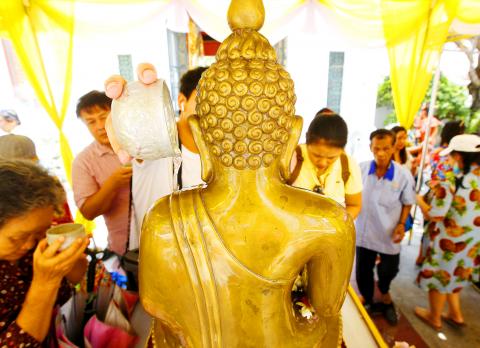
Photo: EPA
照片:歐新社
Songkran is about more than water fights. Traditionally, Thais also go to Buddhist temples to donate money or goods to the temple or monks during the festival, and the monks sprinkle holy water, symbolizing blessings, on them. People also bathe statues of the Buddha by pouring water over them. Thais will also sprinkle water in the hands of family elders, symbolizing respect and the receipt of the elders’ blessings.
Miss Songkran beauty contests are also held throughout Thailand, as a way to preserve traditional Thai costumes.
There are around 700,000 migrant workers in Taiwan. Of these, just over 60,000 are from Thailand.
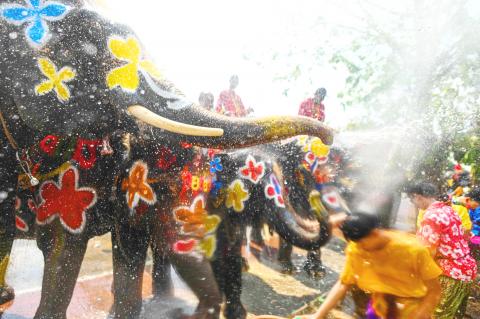
Photo: AFP
照片:法新社
In order to make Thai workers in Taiwan feel at home, Songkran was celebrated on Sunday at the ASEAN Square in Taichung, organized by the Ministry of Labor and the Taichung government. There will be another Songkran celebration held this coming Sunday at City Hall Square in New Taipei City.
(Translated by Lin Lee-kai, Taipei Times)
每年四月十三日到十五日是泰國的傳統新年(Songkran),又音譯為「宋干節」,其中一個習俗就是民眾相互潑水或噴水,以期除舊布新。
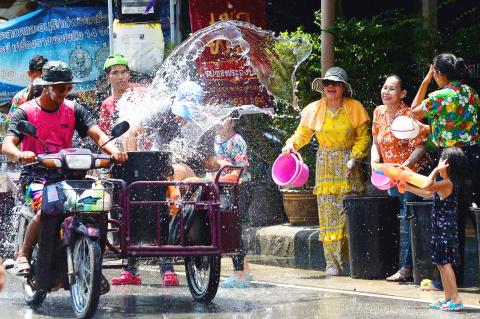
Photo: AFP
照片:法新社
「宋干」一詞來自梵文,有「通過、跨越」的意思,代表進入新的一年。除了泰國,緬甸、柬埔寨和寮國也都會慶祝宋干節。
被台灣人稱為「潑水節」的宋干節,最出名的景象就是大家在街上拿水槍或水桶打水仗。潑水的起源是佛教傳統儀式,因為水代表淨化和祝福。
不過宋干節可不是只有狂潑水而已。泰國人傳統上會在這幾天到佛寺裡奉獻金錢或物品給寺方或僧侶,僧侶們再以聖水灑向民眾,象徵祝福之意,民眾也會以水淋佛像,稱為「浴佛」。此外,泰國人也會把水輕灑在家族長輩手中,象徵尊敬並獲得長輩的祝福。
此外,為了要保存傳統的泰式服飾,泰國各地也會舉辦宋干小姐選美比賽。
在台灣,來台的移工人數已達到七十多萬人,其中來自泰國的移工有六萬人。
為了讓在台灣的泰籍移工一解鄉愁,勞動部與地方政府合作舉辦潑水節活動,十四日已於台中東協廣場舉行,二十一日則將在新北市政府市民廣場舉辦。
(中央社)
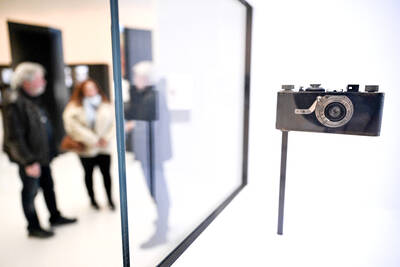
Photographer Franziska Stuenkel likes to take spontaneous urban shots, so she needs a nimble camera that is ready to go when inspiration strikes: her German-made Leica M11. “I have to be very quick and discreet,” said the Berlin-based artist who captures reflections of people walking past windows, their contours merging with the shapes behind the glass. Stuenkel’s compact Leica is the perfect camera for the job, the 51-year-old told AFP. Famous for its pocket-sized and retro-style devices, the Leica brand is celebrating a milestone as it marks 100 years since its first commercial camera was presented to the public. The

Picture a 45-foot-long animal with a 5-foot-long skull and 3-foot-long arms. It may not seem strange until you realize that a human with those proportions would be 6 feet tall with 5-inch arms. Although the Tyrannosaurus rex went extinct 65 million years ago, the mystery of its unusual body __1__ has fascinated scientists for over a century. Barnum Brown, the paleontologist who first discovered T. rex fossils, initially found it hard to believe that the tiny arms belonged to such a __2__ creature. One of his colleagues speculated that the short forelimbs might have been used to hold the
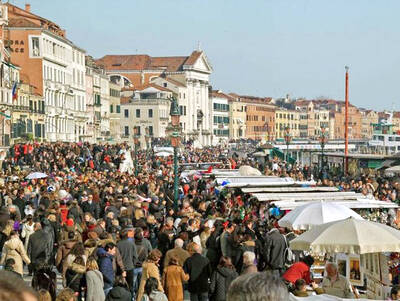
As global travel rebounds following the COVID-19 pa ndemic, the longstanding issue of overtourism has returned stronger than ever. Throughout 2024, numerous popular destinations worldwide struggled with tourist numbers that far exceeded their infrastructural and environmental capacities. Not only does this surge congest streets and pollute landscapes, but it also endangers cultural sites and disrupts the daily lives of residents. In response to the growing problem of “overtourism,” various nations have adopted diverse strategies, some of which have sparked controversy. Venice, Italy, has not hesitated to take bold action; since 2024, the city has implemented one of the
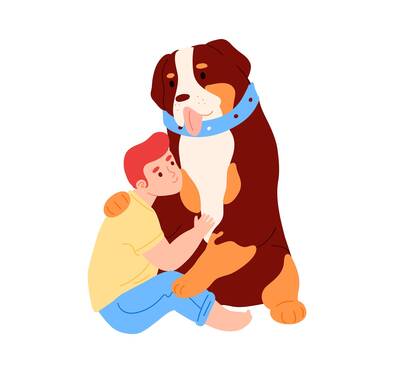
Dogs’ noses are incredibly keen. They can even detect changes in cortisol levels in human sweat and breath. Known as the “stress hormone,” cortisol increases when humans are under pressure. Recent research indicates that the smell of human stress can influence a dog’s behavior and emotions. In the study, human volunteers were exposed to the stressful tasks of preparing and delivering a speech on the spot and then solving math problems. __1__ Researchers collected sweat and breath samples from the volunteers on pieces of cloth during both their stressful and restful states. Meanwhile, other researchers worked with 18